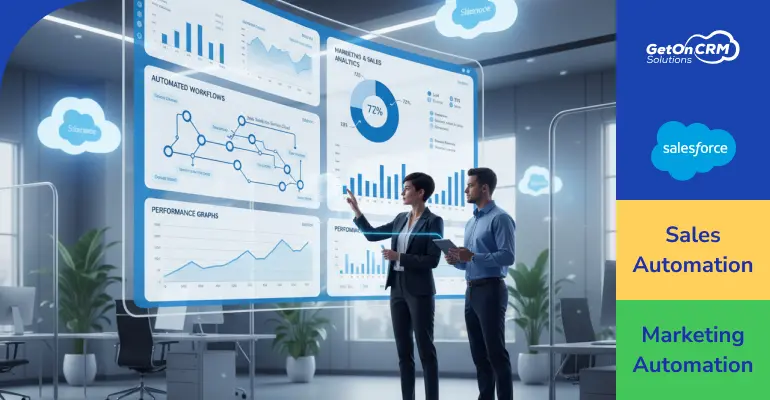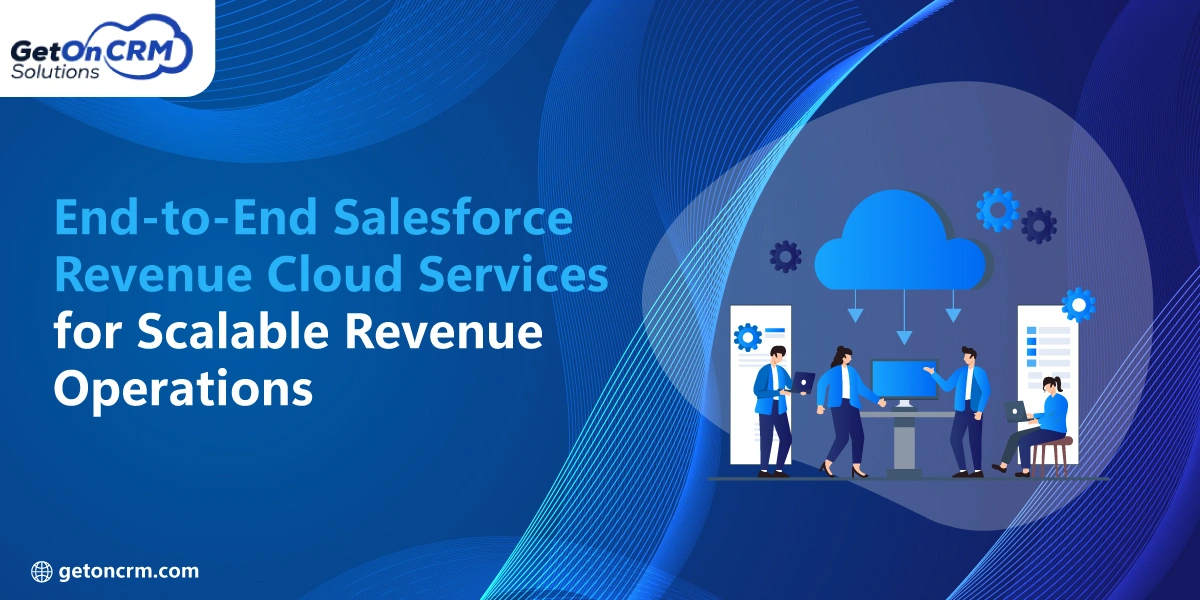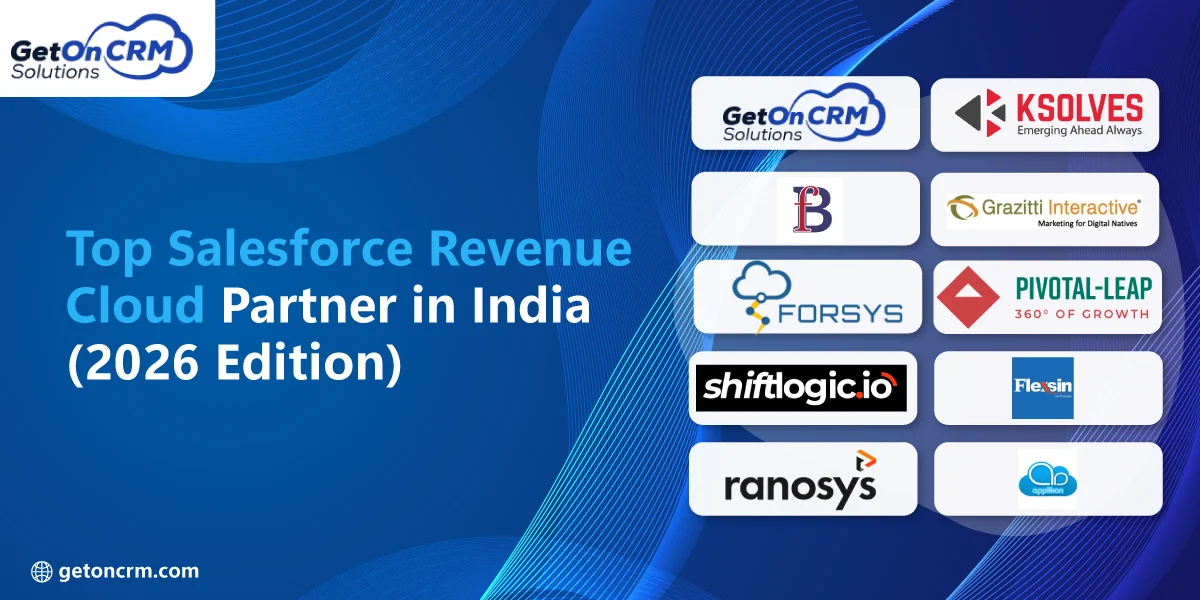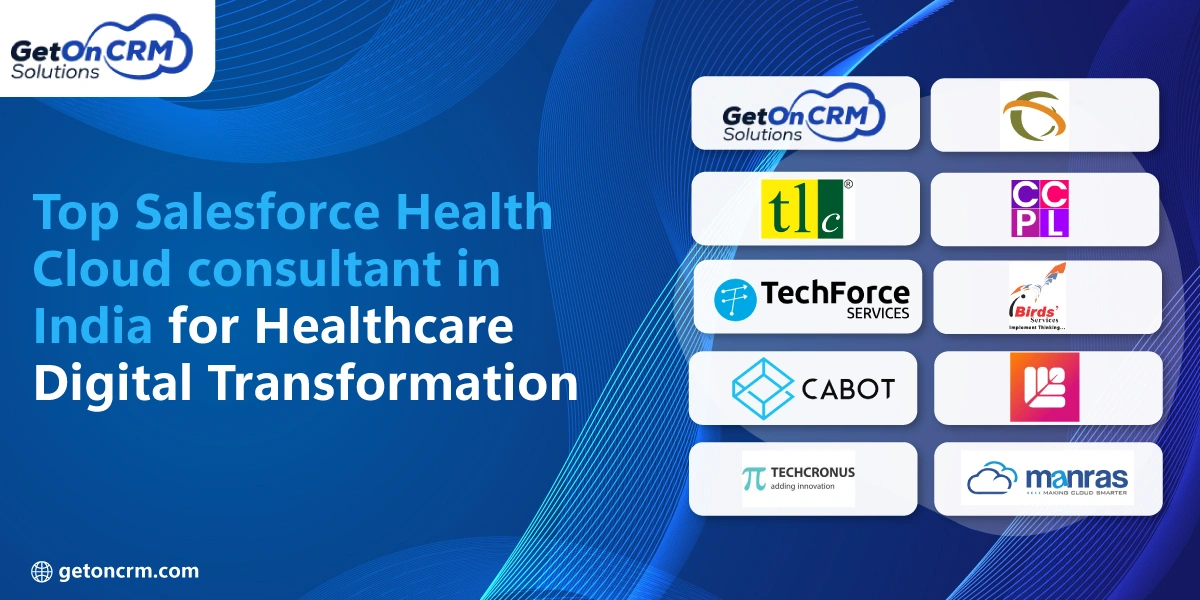Sales and marketing automation is reshaping how companies use Salesforce to speed up processes, personalize outreach, and boost conversions. Within Salesforce, automation links tools like Sales Cloud flows, Marketing Cloud journeys, and account engagement to eliminate tasks that once required hours of manual work. Organizations turn to automation for efficiency, consistency, and stronger ROI — for example, automatic lead scoring, drip campaigns, and triggered emails drive better engagement.
Real-world case: a subscription SaaS firm uses Salesforce to send automated renewal emails 30, 15, and 7 days before expiration to reduce churn, says ortoo. Also, in a blog walkme stated that, when a new customer signs up, Salesforce automatically assigns the lead to a rep and sends a welcome email. This post builds on our prompt template pillar by diving into automation use cases templates simplify. We will explore lead qualification, proposal generation, meeting summaries, and content personalization in detail — showing how Salesforce Marketing Cloud automation and Salesforce CRM automation unify marketing and sales workflows.
What is Sales and Marketing Automation?
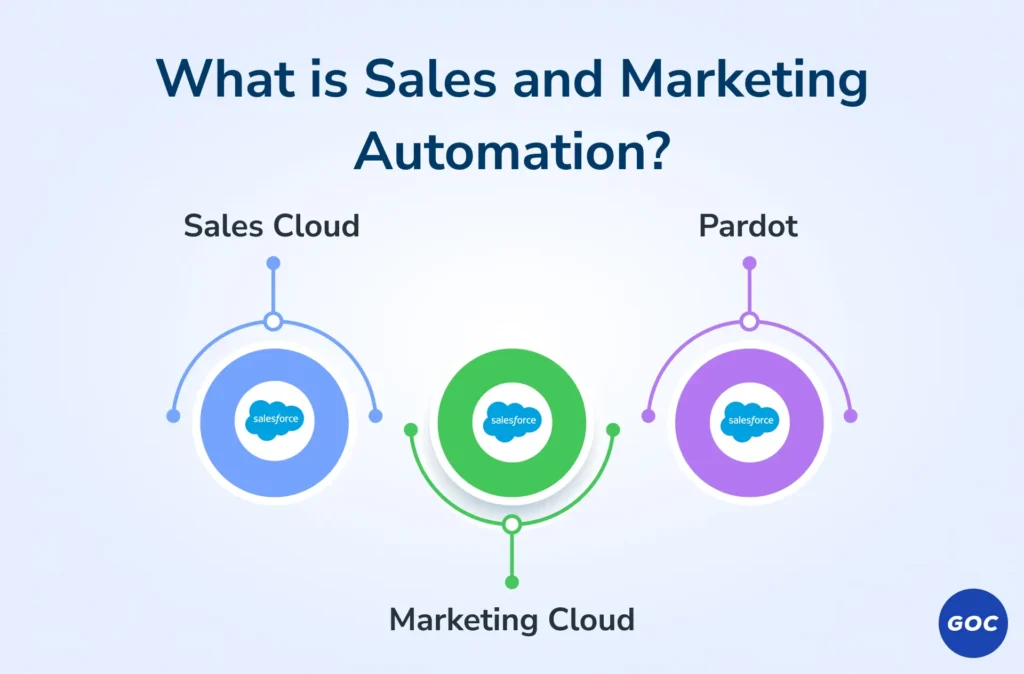
Sales and Marketing Automation in Salesforce refers to using Sales Cloud automation and Marketing Cloud automation to simplify and manage repetitive tasks that often consume time and resources. These include lead nurturing, email campaigns, campaign performance tracking, and automated lead scoring. By implementing sales funnel automation, businesses can shorten the sales cycle, reduce manual errors, and ensure every prospect receives timely follow-ups.
On the marketing side, tools like Pardot help deliver personalized experiences through customer segmentation, behavior-based targeting, and automated engagement journeys. Together, sales and marketing automation enhances team productivity, aligns sales and marketing efforts, and creates a consistent customer experience that builds stronger relationships and boosts ROI.
Why Businesses Need Sales & Marketing Automation?
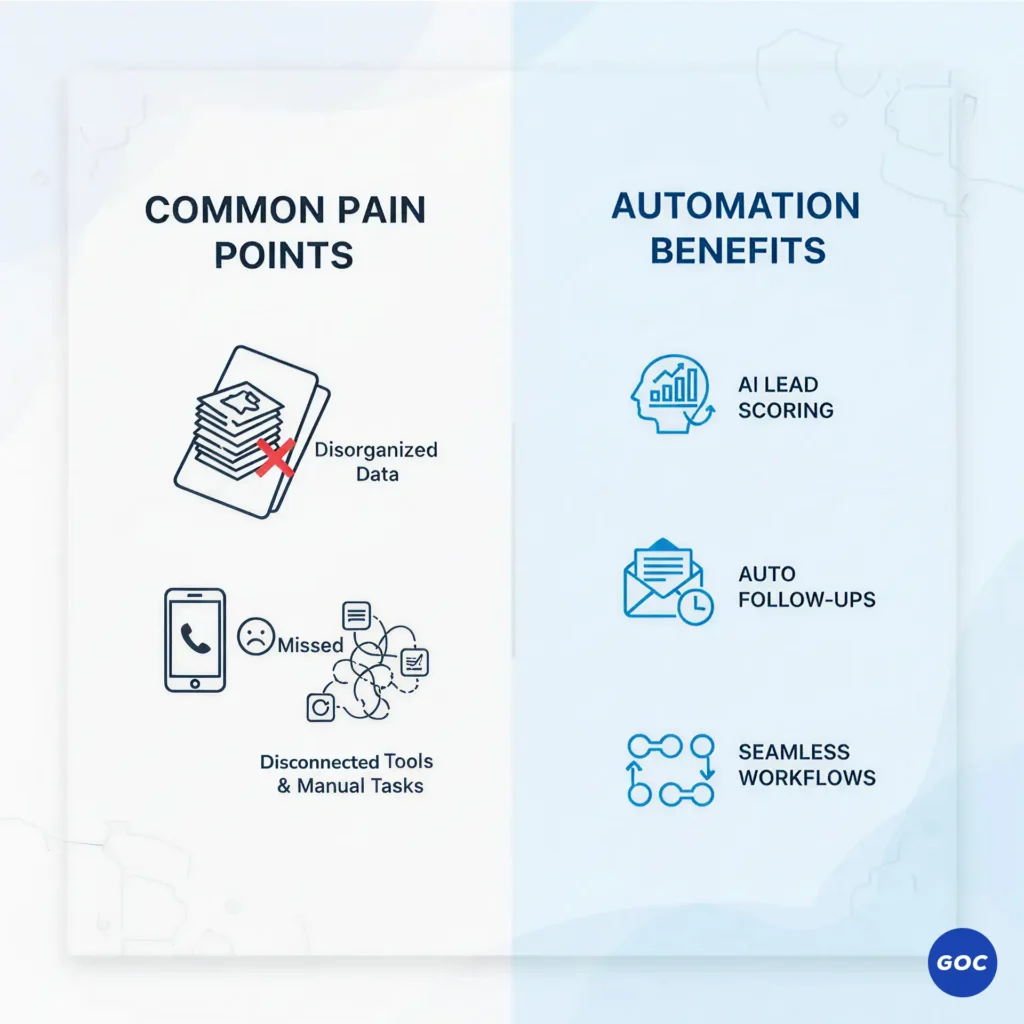
Common Pain Points Businesses Face
Leads slipping through cracks: Sales reps often miss follow-ups when working across multiple tools.
Manual proposal errors: Hand-typed proposals cause mistakes that slow down deal cycles.
Meeting notes lost: Key details from sales calls are scattered and never synced into the CRM.
Generic marketing campaigns: One-size-fits-all outreach fails to connect with customer needs.
Impact on Business Growth
Lost revenue: Missed leads and delayed responses directly cut into sales pipeline performance.
Poor customer experience: Inconsistent communication lowers trust and buyer satisfaction.
Why Automation Solves These Gaps
Salesforce Sales Cloud automation and Salesforce-powered marketing automation help unify sales and marketing workflows, reduce manual tasks, and improve lead nurturing Salesforce Marketing Cloud. Businesses using sales and marketing automation report for faster deal closures, smarter campaign management, and stronger customer engagement.
Quick Stats to Prove the Case
Salesforce marketing automation drives a 14.5% increase in sales productivity and a 12.2% reduction in overall marketing overhead.
Salesforce CRM automation adoption continues to rise with measurable ROI across industries.
Salesforce report says, 83% of sales teams with AI saw revenue growth this year vs. 66% without AI.
Are You Curious About: Salesforce Marketing Cloud V/S Classic this blog is for you.
Core Areas of Automation in Salesforce Sales & Marketing
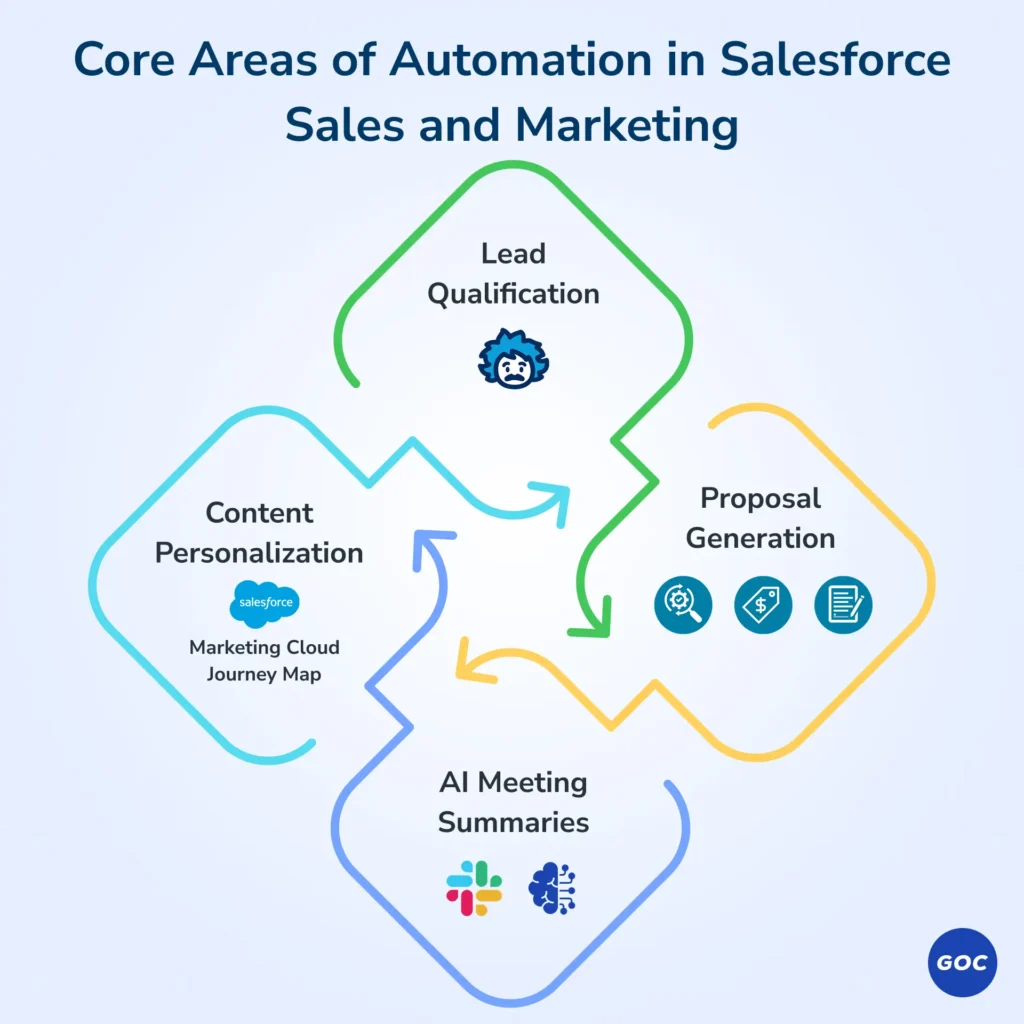
Sales and marketing teams in the US market are moving away from repetitive manual work and depending more on Salesforce automation to speed up the sales cycle. Below are the most impactful areas where automation creates real business outcomes.
➥ Lead Qualification Automation in Salesforce Sales Cloud
Sales reps often waste hours chasing unqualified leads. Lead qualification automation in Salesforce solves this by automatically scoring, routing, and segmenting leads.
What is it? → Automatically scoring, routing, and segmenting leads.
How it works in Salesforce? → Lead scoring models, AI-based qualification, Salesforce flow.
Why it matters? → Saves sales team time, prioritizes hot leads.
Tools/Examples → Einstein Lead Scoring, automation flows.
Table: Challenges vs. Benefits vs. Automated Salesforce Solutions
| Challenges | Benefits | Automated |
|---|---|---|
| Sales reps waste time on cold leads | Focus on high-quality prospects | Einstein Lead Scoring + Workflow Rules |
| Inconsistent follow-ups | Standardized routing | Automation Flows in Sales Cloud |
| Missed opportunities | Increased conversion rate | Automated Lead Scoring Salesforce |
Legacy systems can slow down automation. Learn how Salesforce integration solutions ensure seamless data sync between your CRM, ERP, and marketing platforms.
➥ Proposal Generation Automation with Salesforce CPQ
In B2B sales, creating proposals and contracts manually often leads to errors and delays. Salesforce CPQ can be configured to auto-generate proposals and quotes, ensuring they are branded and error-free.
What is it? → Auto-creating proposals, contracts, or quotes from CRM data.
Why important? → Faster cycle, fewer errors, standardized messaging.
How does Salesforce support it? → CPQ tools, template-based proposals.
Scenario → A sales rep closes a deal, and automation generates a branded proposal in minutes.
➥ AI-Powered Meeting Summaries Automation in Salesforce + Slack
Meetings are packed with valuable insights, but sales teams often miss key action items. Meeting summaries automation makes sure nothing falls through the cracks.
What is it? → AI generating summaries, action items, and follow-ups from sales/marketing meetings.
Why it matter? → Ensures no missed tasks, improves collaboration.
Salesforce + Slack AI integration → Real-time meeting note capture.
Example → After a discovery call, automation generates structured notes that sync directly into Salesforce CRM.
➥ Content Personalization Automation in Salesforce Marketing Cloud
Customers in the American market expect personalized experiences. Marketing Cloud automation in Salesforce helps companies deliver that at scale.
What is it? → Delivering targeted content based on buyer journey, persona, or past behavior.
Why critical? → 80% of customers expect personalized interactions.
Salesforce Marketing Cloud + AI → Dynamic email campaigns, personalized landing pages.
Use Case → Automated campaigns send product recommendations based on browsing history.
Benefits of Sales & Marketing Automation (Cross-section Summary)
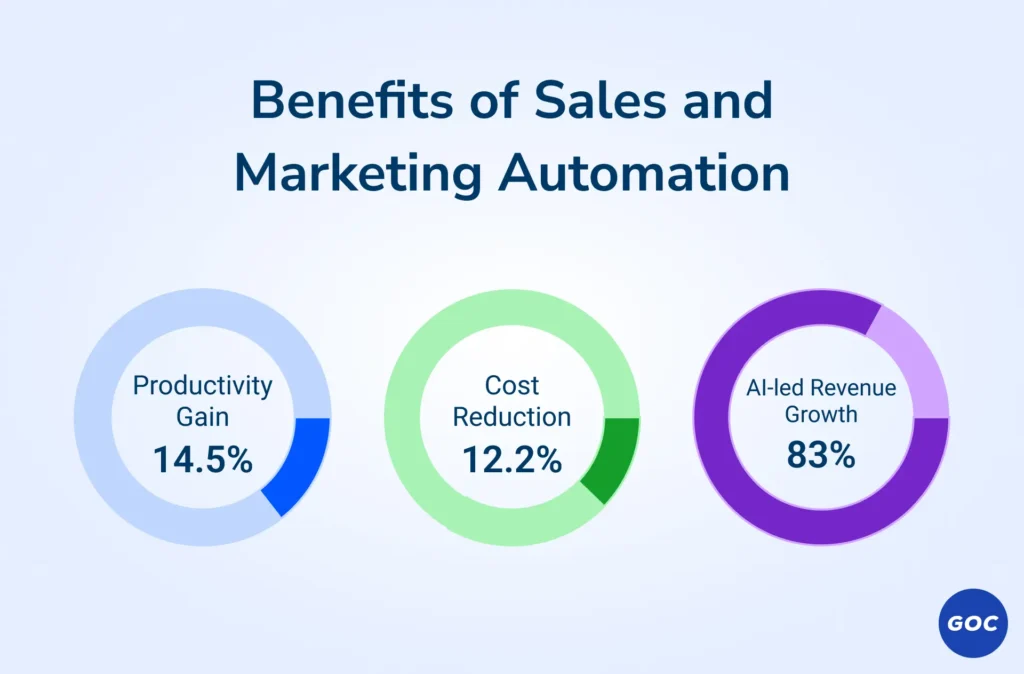
Salesforce CRM automation brings together sales and marketing in a single ecosystem. By combining Salesforce Sales Cloud automation and Salesforce automation for marketers, teams can streamline their daily operations and drive measurable results.
Increased productivity for sales teams: With sales funnel automation Salesforce, reps spend less time on repetitive tasks and more time closing deals.
Consistent brand voice in proposals & content: Marketing automation tools Salesforce ensure messaging stays aligned across emails, proposals, and multichannel campaigns.
Better customer experience via personalization: Through Salesforce journey builder automation and campaign management Salesforce, customers receive tailored interactions that build trust.
Faster deal cycles: Salesforce Sales Cloud automation for B2B sales teams accelerates lead-to-revenue conversion.
Reduced manual errors: Automated workflows in Salesforce CRM automation minimize mistakes in lead assignment, automated lead scoring Salesforce, and follow-ups.
For deeper insight, explore our How Prompt Templates are Transforming Salesforce Workflows — templates make this automation accessible and scalable, helping teams apply Salesforce Marketing Cloud Account Engagement automation and lead nurturing Salesforce Marketing Cloud effectively.
This approach ensures marketing and sales alignment, supports multichannel campaign automation Salesforce, and enhances customer engagement automation Salesforce—all critical for scaling in 2025.
Better customer experience via personalization: Through Salesforce Journey Builder automation and campaign management Salesforce, customers receive tailored interactions that build trust. Learn how to unify customer data with Salesforce Clouds to enhance personalization and engagement.
Challenges & Considerations: What to Know Before Automating in Salesforce
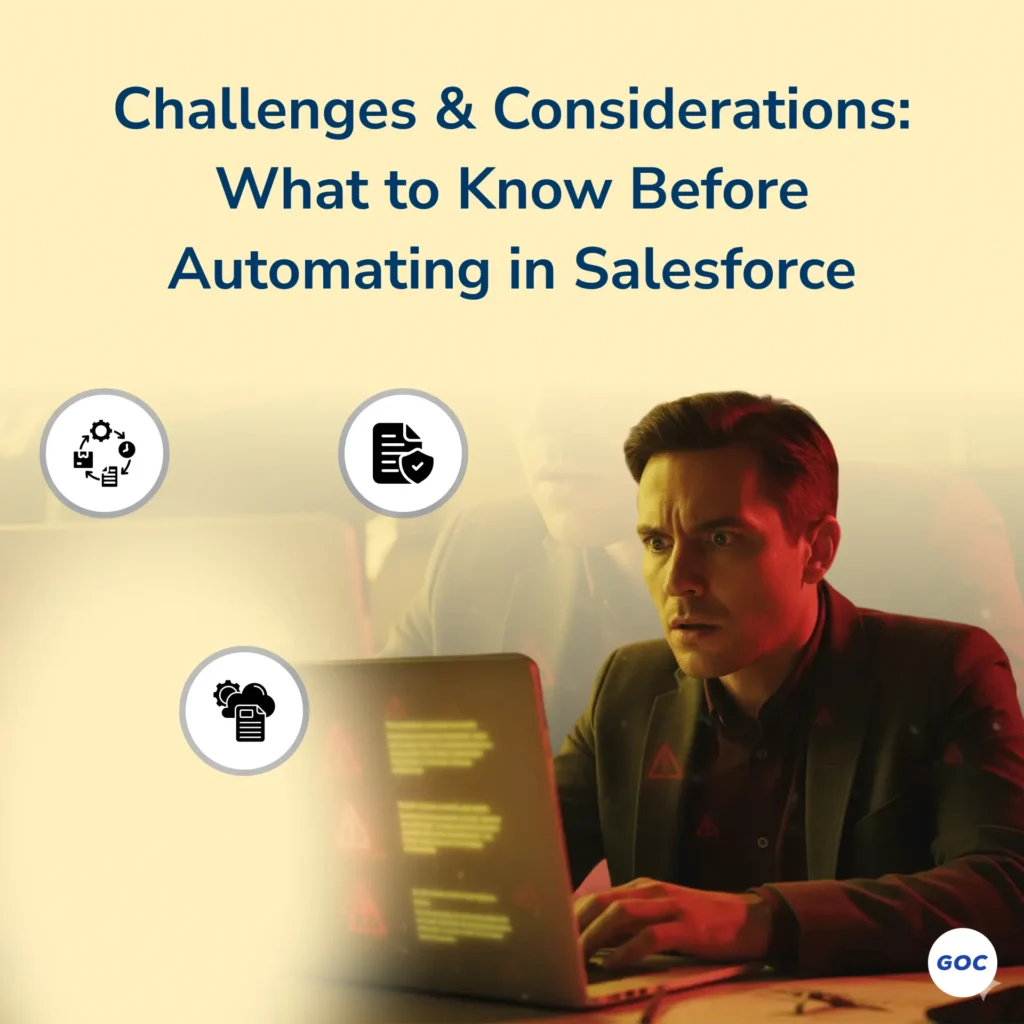
Salesforce Marketing Cloud automation and Salesforce Sales Cloud automation offer big advantages, but businesses should address these challenges first.
Over-automation risks → Avoid robotic tone; Salesforce CRM automation should feel personal.
Data quality dependency → Marketing automation tools Salesforce need clean, reliable records.
Integration issues → Legacy systems can slow down sales and marketing automation Salesforce.
Security & compliance → Protect meeting notes and customer data in Salesforce Pardot automation and campaign management Salesforce.
Start small, scale → Begin with automated lead scoring Salesforce or sales funnel automation Salesforce, then expand.
Pro tip: When exploring how to implement sales and marketing automation in Salesforce, start with simple workflows like using Pardot for automated lead nurturing in Salesforce before moving to advanced Salesforce journey builder automation.
How Prompt Templates Connect to Automation in Salesforce
Prompt templates in Salesforce work like quick-start buttons—speeding up sales and marketing automation Salesforce without manual entry.
In Salesforce automation marketers launch campaigns, nurture sequences, or journeys in one click.
In Marketing Cloud automation, reps trigger follow-up emails, lead scoring, or deal updates instantly.
Example: A pre-built prompt like “Summarize meeting + create follow-up email” kicks off automated workflows.
These templates tie together Salesforce CRM automation, lead nurturing Salesforce Marketing Cloud, campaign management Salesforce, and automated lead scoring Salesforce—making sales funnel automation Salesforce faster and more consistent.
For 2025, teams focusing on Automated marketing with Salesforce best practices, Pardot for automated lead nurturing, and B2B sales workflows rely on prompt templates to cut time and improve engagement across every channel.
Meetings are packed with valuable insights, but sales teams often miss key action items. Learn how AI in Salesforce powers smarter meeting summaries and actionable insights that sync instantly across your CRM.
Conclusion: Driving Growth with Salesforce Automation
Automation in Salesforce isn’t just about efficiency—it’s about giving sales and marketing teams more bandwidth to focus on relationships, strategy, and closing deals. From smarter lead qualification and automated proposals to personalized campaigns and seamless meeting scheduling, Salesforce Marketing Cloud automation and Salesforce Sales Cloud automation redefine how businesses engage customers. By aligning sales and marketing automation Salesforce practices with Salesforce CRM automation, organizations accelerate revenue growth, shorten sales cycles, and elevate customer experiences—without losing the human touch.
Ready to Explore How to Implement Sales and Marketing Automation in Salesforce?
Salesforce Automation: Frequently Asked Questions
What is an example of sales automation?
Sales automation in Salesforce CRM includes automated lead scoring Salesforce, task reminders, follow-up emails, and pipeline updates, streamlining workflows to boost efficiency and support faster deal closures.
How does marketing automation differ from sales automation?
Marketing automation tools Salesforce focus on nurturing leads, campaign management, and multichannel engagement, while Salesforce Sales Cloud automation manages deals, pipeline tracking, and revenue-focused tasks.
Which tasks can be fully automated in Salesforce CRM?
Tasks like lead assignment, follow-up reminders, email campaigns, proposal creation, and scoring leads can be automated using sales funnel automation Salesforce and Salesforce Pardot automation.
Can AI replace manual proposal writing?
AI can draft personalized proposals faster using templates, predictive insights, and marketing automation workflows in Salesforce CRM, but human oversight ensures accuracy and relationship personalization.
How does automation improve customer engagement?
Automation enables timely, personalized interactions, multichannel campaigns, and customer engagement automation Salesforce, enhancing lead nurturing, conversions, and overall satisfaction while saving teams significant time.


